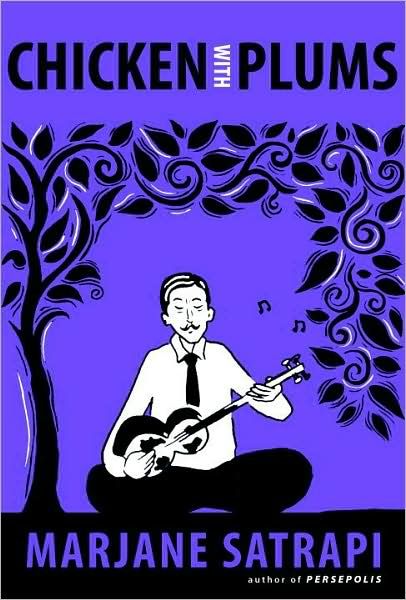Written and Illustrated by Marjane Satrapi
Pantheon; $12.95
Chicken with Plums is a misleading title for a murder mystery, but it’s especially appropriate for the one Marjane Satrapi has created. Chicken with Death or Murder with Plums: then you know what you’re getting into. Satrapi sneaks up on you though. You think you’re reading a slice-of-life story about her great-uncle and then you realize that he’s about to die and you’ve got no idea why. The twist that he’s going to kill himself makes it that much more intriguing.
Nasser Ali Khan is a great musician in Iran, but when his wife destroys his tar in the latest of a series of escalating arguments, his efforts to replace the beloved instrument are fruitless. In despair, he takes to his bed and gives up on life, declaring that he's going to die in a week, presumably from starvation since he won't eat. He won't even take his favorite meal (you only get one guess as to what that is), which I guess represents the joy of life that Nasser Ali Khan has now turned his back on.
It's such an implausible scenario, but Satrapi pulls the reader along with a strong characters, a delightful voice, and subtle clues that there's more to Nasser Ali Khan's anguish than a broken frickin tar. Why is he really killing himself? There's the mystery.
I showed the book to an artist friend of mine today and the first words out of her mouth were to express envy at Satrapi's ability to convey so much in so few lines. Not that this is a unique ability, but Satrapi's got it. Her work is exquisitely uncluttered. She only draws what needs to be there.
But at the same time, everything that has to be there is. Characters are distinct and Satrapi has a slew of emotions and personalities that she's able to convey. This is vital because we need these characters to be real if we're going to care about what happens to this man who - at face value - appears to be self-absorbed. Though he's often angry, Nasser Ali Khan's overwhelming sadness is obvious as well. I may not understand him (not at first anyway), but I pity him. And I especially pity the people in his life who care about him and - like me - aren't sure what he's trying to accomplish or why.
While she's telling us about all of this, Satrapi interjects her own thoughts. She never knew Nasser Ali Khan, so she talks about his relatives whom she does know. She goes off on interesting little sidebars to relate stories about what happened to his kids and how his death affected them. It's almost stream-of-consciousness the way she does it; very much like she's with you, telling you the story in person. But she never lets things go too far off track and always comes back around to Nasser Ali Khan's story before you become disinterested. She's a masterful storyteller. I'm bumping Persepolis up in my reading queue after this.
None of this though would've made the book worth recommending had Satrapi not paid off the mystery so well. Had Nasser Ali Khan killed himself over his favorite instrument, the best art and the most charming narrative in the world wouldn't have saved it for me. I guess if I was a hardcore musician I might have understood his motivations in that scenario, but I'm not. I need another incentive that I can relate to. Satrapi supplies it and it damn near broke my heart.
Five out of five Azraels.


